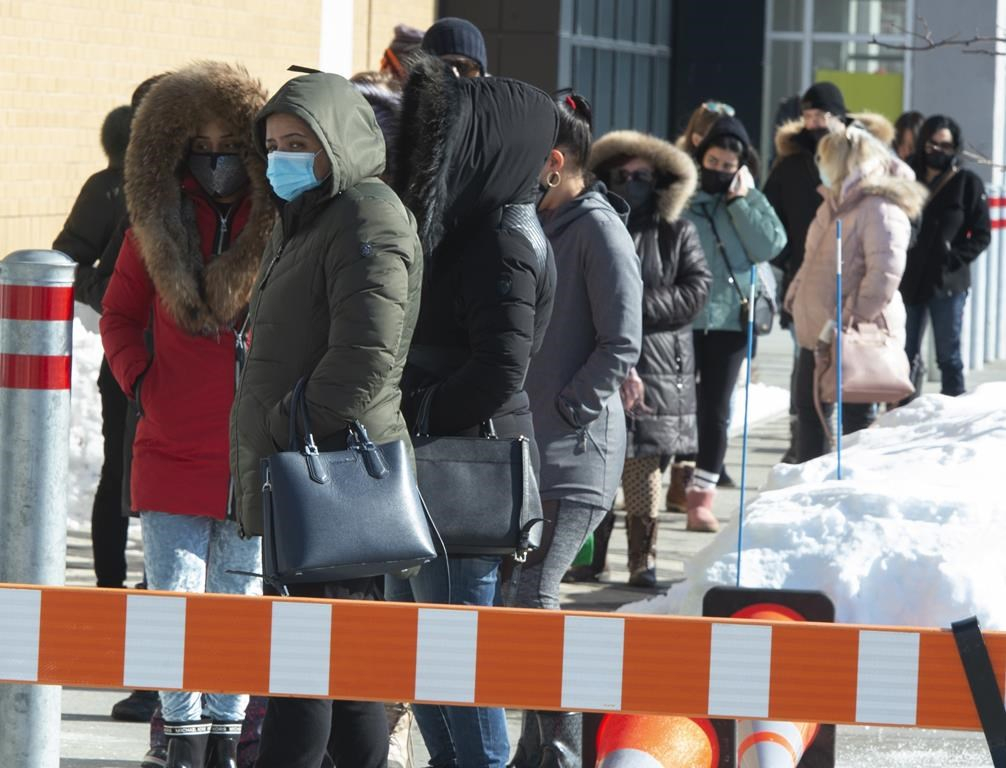While the soaring rate of new COVID-19 infections has moderated substantially across the country in recent weeks because of anti-pandemic restrictions, health authorities warned against complacency.
Lockdowns and other restrictions appear to have had a significant effect in curbing the spread of the novel coronavirus, and strong measures need to stay in place, the Public Health Agency of Canada said in its latest summary.
"We are observing a steady decline in COVID-19 activity," the agency said. "With still-elevated daily case counts, the risk remains that trends could reverse quickly."
To date, Canada has seen more than 810,000 cases, with deaths approaching 21,000. The agency also noted the emergence of new variants of concern, with eight provinces now reporting finding new strains.
Despite falling case numbers, the financial costs of the pandemic remain steep.
Ontario, which has seen an almost 70 per cent plunge in new daily cases in the past month, also said it's one-time pandemic spending had reached $13.3 billion.
The money, from Ottawa, is going to support small business, hospitals and nursing homes, the province said in its third-quarter fiscal update, which also projected a $38.5-billion deficit this year.
"These deficits are not sustainable," Finance Minister Peter Bethlenfalvy said.
The province also said it had now set aside $3.9 billion for further pandemic-related spending.
The severity of the pandemic was brought into sharp relief by a new study reported on Wednesday that COVID-19 is 3.5 times more deadly than influenza. The study, which looked at hospitalizations for the flu between November 2019 and June 2020 in seven large Canadian hospitals, also found COVID patients needed more intensive care treatment and stayed in hospital longer than those with influenza.
"We can now say definitively that COVID-19 is much more severe than seasonal influenza," Dr. Amol Verma, of St. Michael's Hospital and the University of Toronto, said in a release.
The pandemic has also caused angst in Newfoundland and Labrador, where an outbreak in the St. John's region erupted in the middle of an election campaign. In the past two days, health officials reported 41 new cases of COVID-19 in the eastern health region, which includes the capital.
The province's opposition parties have attacked incumbent Liberal Premier Andrew Furey for calling the election in the middle of the pandemic. In response, Furey said on Wednesday that other, harder-hit provinces had voted safely during the pandemic.
"We've seen it in other jurisdictions with a higher burden of the disease," Furey said.
Ontario reported 1,072 new infections and 41 more deaths on Wednesday, while Quebec reported 989 new infections and 34 deaths.
The slowing rate of new cases prompted Ontario to end a state of emergency and allow three regions to reopen their economies Wednesday. The change ended stay-at-home orders and allowed restaurants and non-essential businesses to open their doors.
Remaining Ontario regions — with the exception of the Greater Toronto Area — were similarly set to ease lockdown measures next week. Toronto, Peel Region and York Region could follow suit on Feb. 22 depending on their situations at the time.
"Canadians are urged to remain vigilant and to continue following local public health advice as well as consistently maintaining individual practices that keep us and our families safer," the public health agency said.
This report by The Canadian Press was first published Feb. 10, 2021.





Comments